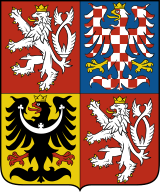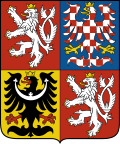This article needs additional citations for verification. (August 2016) |
Politics of the Czech Republic | |
|---|---|
 | |
| Polity type | Unitary parliamentary republic |
| Constitution | Constitution of the Czech Republic |
| Formation | 1 January 1993 |
| Legislative branch | |
| Name | Parliament of the Czech Republic |
| Type | Bicameral |
| Meeting place | |
| Upper house | |
| Name | Senate |
| Presiding officer | Miloš Vystrčil, President of the Senate |
| Lower house | |
| Name | Chamber of Deputies |
| Presiding officer | Markéta Pekarová Adamová, President of the Chamber of Deputies |
| Executive branch | |
| Head of state | |
| Title | President |
| Currently | Petr Pavel |
| Appointer | Direct popular vote, two-round system |
| Head of government | |
| Title | Prime Minister |
| Currently | Petr Fiala |
| Appointer | Chamber of Deputies |
| Cabinet | |
| Name | Cabinet of the Czech Republic |
| Current cabinet | Cabinet of Petr Fiala |
| Leader | Prime Minister |
| Headquarters | Straka Academy, Prague |
| Ministries | Ministerial departments |
| Judicial branch | |
| Name | Judiciary |
| Constitutional Court | |
| Seat | Joštova 625, Brno |
| Supreme Court | |
| Seat | Burešova 20, Brno |
| Supreme Administrative Court | |
| Seat | Moravské náměstí 6, Brno |
 |
|---|
|
|
The Czech Republic is a unitary parliamentary republic, in which the president is the head of state and the prime minister is the head of government.[1] Executive power is exercised by the Government of the Czech Republic, which reports to the Chamber of Deputies. The legislature is exercised by the Parliament. The Czech Parliament is bicameral: the upper house of the Parliament is the Senate, and the lower house is the Chamber of Deputies. The Senate consists of 81 members who are elected for six years. The Chamber of Deputies consists of 200 members who are elected for four years. The judiciary system is topped by the trio of the Constitutional Court, Supreme Court and Supreme Administrative Court.
The highest legal document is the Constitution of the Czech Republic, complemented by constitutional laws and the Charter of Fundamental Rights and Freedoms. The current constitution went in effect on 1 January 1993,[2] after the dissolution of Czechoslovakia.
The Czech Republic has a multi-party system. Between 1993 and 2013, the two largest political parties were the centre-left Czech Social Democratic Party (ČSSD) and centre-right Civic Democratic Party (ODS). This changed in early 2014, with the rise of a new major political party ANO 2011, which has since led two cabinets.
The Economist Intelligence Unit rated Czech Republic a "flawed democracy" in 2022.[3][needs update] According to the V-Dem Democracy indices the Czech Republic was 2023 the 16th most electoral democratic country in the world.[4]
- ^ "Czech Republic | World news". The Guardian. Retrieved 4 October 2018.
- ^ "Constitution of the Czech Republic". Chamber of Deputies, Parliament of the Czech Republic. Retrieved 30 January 2021.
- ^ Democracy Index 2023: Age of Conflict (PDF). Economist Intelligence Unit (Report). 2024. Archived (PDF) from the original on 9 June 2024. Retrieved 22 July 2024.
- ^ V-Dem Institute (2023). "The V-Dem Dataset". Retrieved 14 October 2023.